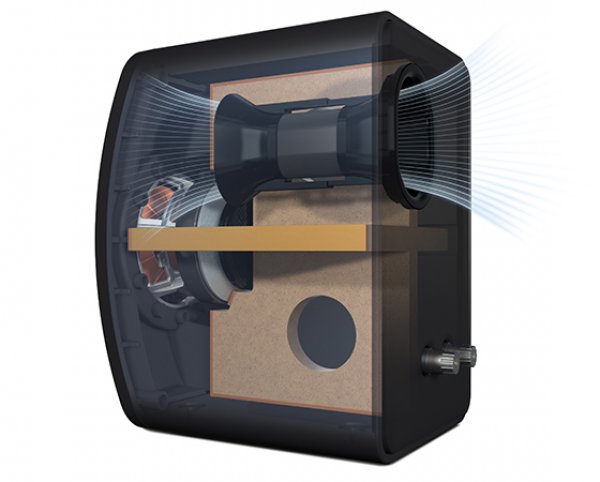In this review, we will be comparing two different type of speakers . Q Acoustics M40 is a Floor-standing speaker whereas the LS50C Meta is a Center Channel speaker.
Let's have a brief look at the main features
of Q Acoustics M40 and KEF LS50C Meta first before getting into our more
detailed comparison.
Q Acoustics M40 Key Specs
- 2-way Design
- 50-watt RMS( 100-watt Peak) Integrated Amplifier
- 0.875" Dome Tweeter
- 2 x 5" Woofer
- 38-22k Hz Frequency Response
- 24-bit Max Depth / 192 kHz Max Sample Rate
- Built-in 5.0 Bluetooth
- Weight:11.80kg
- Dimensions (H x W x D): 710.0" x 10" x 11.7"( 250 x 710 x 296 mm )
KEF LS50C Meta Key Specs
- 2-way Design
- 12th Generation Uni-Q Driver
- 1" Vented dome Tweeter
- 5.25" aluminum Woofer
- 79-28k Hz Frequency Response
- 85 dB Sensitivity
- Impedance: 8ohms
- Power Range:40-100watts
- Weight:7.82kg
- Dimensions (H x W x D): 301.0" x 7-7/8" x 11-1/16"( 301.0 x 201.0 x 281.0mm )
In the following sections, we will get into more detail in order to better understand how the Q Acoustics M40 and KEF LS50C Meta compare and hopefully end up with enough arguments to decide which one of these loudspeakers is the better choice for you.
**This post contains affiliate links, and I will be compensated if you make a purchase after clicking
through my links. As an Amazon Associate I earn from qualifying purchases.
Drivers
Both M40 and LS50C Meta are 2-way speakers.
| Driver |
Q Acoustics M40 |
KEF LS50C Meta |
|
Driver Setup
|
2-way
|
2-way
|
|
Tweeter
|
0.875-inch
|
1-inch
|
|
Midrange
|
- |
- |
|
Woofer
|
2 x 5-inch
|
1 x 5.25-inch
|
M40 features a 0.875" Dome Tweeter and 2 x 5" Woofer . On the other hand, the LS50C Meta features a 1" Aluminum Vented dome Tweeter and 1 x 5.25" aluminum Woofer with a Crossover frequency at 2100Hz.
Frequency Response
M40 has a frequency range of 38-22k Hz whereas LS50C Meta has a frequency range of 79-28k Hz. With a minimum frequency of 38Hz, the M40 can go significantly deeper on the low side and provide stronger bass compared to the LS50C Meta's min frequency of 79Hz.
Below graphs depict how these two speakers compare with the max, min and average values of the Min and Max Frequencies of other speakers in the Floor-standing class in our database.
Low Frequency
Floor-standing Speakers
High Frequency
Floor-standing Speakers
None of these speakers achieves full range experience which is commonly agreed as 20Hz-20kHz. In order to achieve lower lows / deeper bass, we recommend you pair these with a subwoofer. Visit our Powered Subwoofers section to find out more about the available options.
Cabinet Type and Port Position
Both M40 and LS50C Meta have rear firing ports. Rear ported speakers generally need more room between the backside of the speaker and the wall compared to sealed and front/bottom ported speakers. Placing the speakers too close to the walls may cause the bass to sound boomy.
If you are limited in space and can't get the speakers away from the backwall, check our Speakers with Front Firing Ports page.
 KEF LS50C Meta off-set flexible Port
KEF LS50C Meta off-set flexible Port
Physical Specs
Size of a speaker can sometimes become an important decision factor due to space constraints or in some cases purely for esthetic reasons. In this section, we are going to compare Q Acoustics M40's and KEF LS50C Meta's external dimensions. Q Acoustics M40 has external dimensions of 250 x 710 x 296 mm ( 10 x 28 x 11.7 inch) whereas KEF LS50C Meta has external dimensions of 301.0 x 201.0 x 281.0mm ( 11-13/16 x 7-7/8 x 11-1/16inch) .
Q Acoustics M40 is clearly the larger of the two speakers. Its body is 49mm wider, 409mm taller and 15mm deeper than KEF LS50C Meta.
Base Surface Area Comparison
Base surface area of a loudspeaker may become a determining factor when the space in your room or desk is limited.
The base surface area of the Q Acoustics M40 is approximately 740.0cm2 / 114.7inch2 and base area of the KEF LS50C Meta is approximately 564.8cm2 / 87.5inch2. The M40 requires 31% more surface area than the LS50C Meta which gives it a small disadvantage on placement in tight spaces.
What's in the Box of Q Acoustics M40?
Here are the items that are included inside the box of M40:
1x Powered M40 speaker 1x Passive M40 speaker 4x Rear Stabiliser 8x M5 screw 8x Spike Feet 8x Spike Cover 1x Remote Handset (including batteries) 1x Speaker Cable (4 metres) 1x UK Power Cord (2 metres) 1x EU Power Cord (2 metres) 2x Foam Bungs
What's in the Box of KEF LS50C Meta?
Here are the items that come with the LS50C Meta:
Center-channel loudspeakerFoam port plug4 Self-adhesive rubber feetOwners ManualWarranty Registration Card